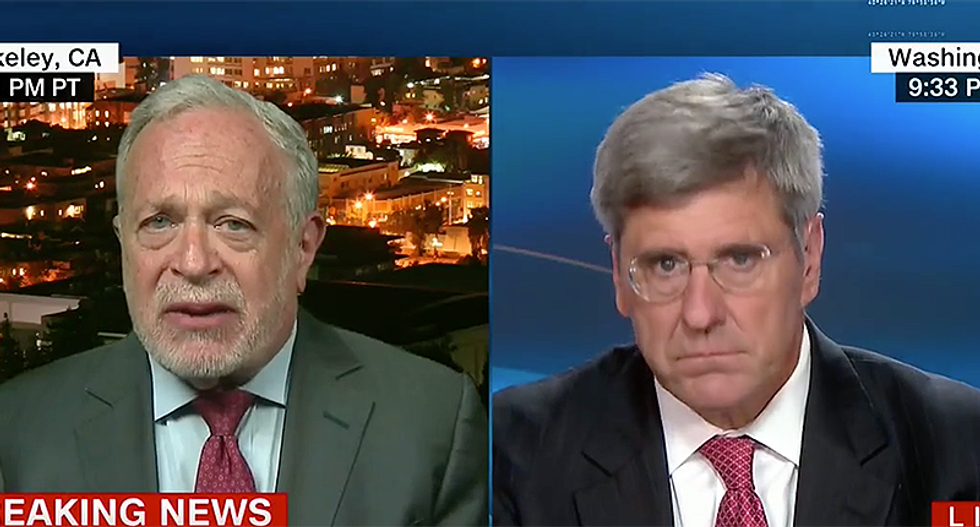
President Donald Trump thinks everything is done with personal relationships, but it doesn't seem to be working with China on trade much less with North Korea on denuclearization.
During an economic discussion about the stock market free-fall Tuesday, former Labor Secretary Robert Reich explained that markets don't like the uncertainty that Trump's economic policies bring.
"Markets don't like it when a president says one thing and the truth is revealed to be something else," he continued. "Markets get very jittery, particularly when tariffs, Steve [Moore], as you said when there is a lot of talk about raising tariffs and trade wars. There's already a climate of fear out there. And what Donald Trump is doing is just adding to that climate of fear."
Reich recalled a tweet from the president earlier Tuesday when he said that tariffs are great and that they mean more money is coming to the United States. That conclusion was absurd, he explained.
"I mean I don't understand where Donald Trump is getting his economics from," Reich said. "But the people who are advising him obviously are not teaching him anything about the real means of tariffs."
In one of few diversions from the president, informal economic advisor Steve Moore agreed that tariffs are bad for markets, but he tried to downplay it.
"The real danger here is that markets don't like uncertainty," he said.
"Steve, he literally wrote I am a tariff man," Reich said. "That's ridiculous. Right?"
Moore said it was just a negotiating strategy.
"First of all, to put all the blame here on the White House overselling this deal I think is an exaggeration because the truth is from my sources at the White House, they thought they had an agreement with China that certain things would happen and China seemed to be backing off," Moore explained. "Look, the Chinese are hard to negotiate with. They don't have the same -- they don't always keep their word, they cheat, they steal. This is an abusive trade relationship."
CNN host Erin Burnett wondered why then the president would go out and say China agreed to get rid of their tariffs if it wasn't true. Lying isn't exactly a negotiation strategy.
"That's a fair point, Erin," Moore conceded. "Look, one of the things that Trump ought to do, if you want to get them to yes, keep kind of trying to nurture them to yes. I think that the problem is that he doesn't trust them. Neither do some of the other negotiators on the White House side in this negotiation. The stakes are huge here."
Reich remarked that it's for that reason you "don't want to claim credit for a concession before they have actually given the concession. Otherwise, you run the risk of pushing them even further."
Burnett read Trump's tweets, and Moore called them "total negotiations..."
"That negotiating tactic has worked with these other countries," Moore claimed.
"The problem is it's not working. It's clearly not working," Reich said.
Burnett said that Trump thinks he could go out and shake hands and schmooze and it will make policy but that it doesn't work that way.
"Does he understand that?" she asked.
Moore pivoted away from Trump doing something wrong and said he wondered the same thing about Barack Obama.
Watch the throwdown below:




